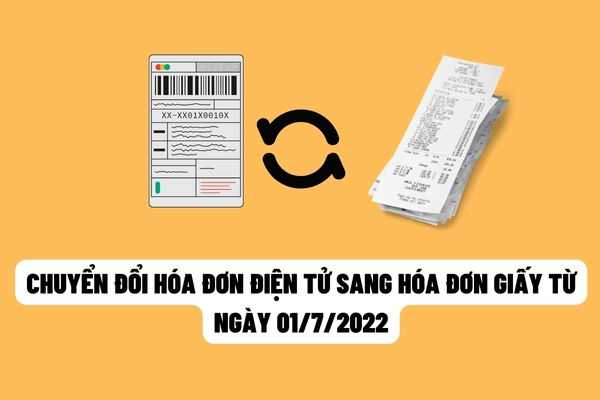Can e-invoices in Vietnam and electronic documents be converted into paper invoices and documents from July 1, 2022?
Prohibited acts in the field of invoices and vouchers in the near future?
Pursuant to Article 5 of Decree 123/2020/ND-CP stipulates as follows:
“Article 5. Prohibited acts in the field of invoices and vouchers
1. For tax officials
a) Causing troubles and difficulties for organizations and individuals to purchase invoices and documents;
b) Acts of covering up or colluding for organizations or individuals to use illegal invoices and documents;
c) Accepting bribes when inspecting and checking invoices.
2. For organizations and individuals that sell or provide goods and services, organizations and individuals have related rights and obligations.
a) Committing fraudulent acts such as using illegal invoices or using illegal invoices;
b) Obstructing tax officials from performing their official duties, specifically acts of obstructing tax officials' health and dignity while inspecting and examining invoices and documents;
c) Illegally accessing, falsifying or destroying the information system on invoices and documents;
d) Giving bribes or performing other acts related to invoices and documents in order to gain illicit benefits.”
Accordingly, the cases specified in the above content will be prohibited in the field of invoices and dictionaries.

Can e-invoices in Vietnam and electronic documents be converted into paper invoices and documents from July 1, 2022?
Principles of making, managing and using invoices and vouchers in the near future?
According to Article 4 of Decree 123/2020/ND-CP stipulating the principles of making, managing and using invoices and documents as follows:
- When selling goods or providing services, the seller must issue an invoice to deliver to the buyer (including cases of goods and services used for promotion, advertising, samples; goods and services). used for giving, giving, giving, exchanging, paying for employees' wages and for internal consumption (except for goods circulated internally to continue the production process); exporting goods in the form of loans, lending or returning goods) and must fully write the contents as prescribed in Article 10 of this Decree. In case of using e-invoices in Vietnam, it must follow the standard data format of the tax authorities as prescribed in Article 10 of this Decree. 12 of this Decree.
- When deducting personal income tax, when collecting taxes, fees and charges, tax withholding organizations, fee and charge collection organizations, and tax collection organizations must make tax withholding vouchers, tax collection receipts, Fees and charges shall be delivered to persons with incomes subject to tax credit, to taxpayers and payers of fees and charges, and must be fully recorded as prescribed in Article 32 of this Decree. In case of using electronic receipts, it must follow the standard data format of the tax authorities. In case individuals authorize tax finalization, personal income tax withholding documents will not be issued.
For individuals who do not sign a labor contract or sign a labor contract for less than 3 months, the income paying organization or individual may choose to issue a tax withholding voucher for each tax deduction or issue a withholding voucher. for multiple deductions in a tax period. For individuals who sign labor contracts of 03 months or more, income-paying organizations and individuals only issue individuals with a tax withholding voucher in a tax period.
- Before using invoices and receipts, enterprises, economic organizations, other organizations, business households and individuals, tax, charge and fee-collecting organizations must register for use with tax authorities or issue notices according to the provisions of Articles 15, 34 and Clause 1, Article 36 of this Decree. For invoices and receipts printed by the tax authority, the tax authority shall issue a notice of issuance according to Clause 3, Article 24 and Clause 2, Article 36 of this Decree.
- Business organizations, households and individuals in the process of using them must report on the use of purchased invoices from tax authorities, on the use of ordered or self-printed receipts or purchase receipts from agencies. tax as prescribed in Articles 29 and 38 of this Decree.
- The registration, management and use of e-invoices and e-documents must comply with the provisions of law on electronic transactions, accounting, tax, tax administration and this Decree.
- Data of invoices and vouchers when selling goods or providing services, data of documents when performing tax payment, tax withholding and payment of taxes, fees and charges is the database to serving tax management and providing information on invoices and documents for relevant organizations and individuals.
- Goods seller or service provider is an enterprise, economic organization or other organization that is authorized to authorize a third party to issue e-invoices for the sale of goods and provision of services. Invoices authorized to be made by a third party must still show the name of the seller as the authorizing party. The authorization must be determined in writing between the authorizing party and the authorized party, showing full information about the authorization invoice (the purpose of the mandate; the duration of the mandate; the method of payment of the authorization invoice). ) and must notify the tax authority when registering to use e-invoices. In case the authorized invoice is an electronic invoice without the tax authority's code, the authorizing party must transfer the electronic invoice data to the tax authority through the service provider. The Ministry of Finance specifically guides this content.
- Charge and fee-collecting organizations are authorized to authorize a third party to make charge and fee receipts. Receipts authorized to third parties still include the name of the fee-collecting organization that is the authorizing party. The authorization must be determined in writing between the authorizing party and the authorized party, showing full information about the authorization receipt (the purpose of the mandate; the duration of the mandate; the method of payment of the authorization receipt). ) and must notify the tax authority when notifying the issue of receipts.
Accordingly, the principles of making, managing and using invoices and vouchers comply with the above regulations.
Can electronic invoices and vouchers be converted into paper invoices in the near future?
Pursuant to Article 7 of Decree 123/2020/ND-CP stipulates as follows:
“Article 7. Converting e-invoices and electronic documents into paper invoices and documents
1. Lawful e-invoices and electronic documents shall be converted into paper invoices or documents when there are economic and financial requirements arising or at the request of tax administration agencies or inspection agencies. audit, inspect, examine, investigate and in accordance with the law on inspection, examination and investigation.
2. The conversion of e-invoices and e-documents into paper invoices and documents must ensure the correct match between the contents of the e-invoices and e-documents and the paper invoices and documents after the transfer. change.
3. If an electronic invoice or electronic document is converted into a paper invoice or document, then the paper invoice or voucher is only valid for keeping for bookkeeping and monitoring in accordance with the provisions of law on accounting. The law on electronic transactions is invalid for transactions and payments, except for the case that invoices are generated from cash registers with an electronic data transfer connection with tax authorities as prescribed in this Decree. .”
Thus, the conversion of electronic invoices and vouchers into paper invoices and documents shall comply with the above provisions.
Decree 123/2020/ND-CP will take effect from July 1, 2022.
LawNet
